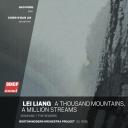The apartment building in which the composer Lei Liang grew up, in Beijing in the 1970s, was a musicological beehive. Its residents worked at the Music Research Institute of the Chinese Academy of Arts, which had an archive of rare historical recordings that had been saved, often at great personal cost, from destruction in the Cultural Revolution.
News and Press
Lei Liang (b1972) was born in China then in the grip of the Cultural Revolution, but left to study in the US and has remained there ever since, taking citizenship in 2006. The alto saxophone concerto Xiaoxiang was composed shortly
afterwards (2009, though based on an earlier piece for saxophone and electronics); it is given here in its 2014 revision. A concentrated (ten-and-a half minute) concerto-cum-tone poem, its single span was derived from an
Lei LIang (b. 1972) seeks to "create music as if painted with a sonic brush." Painting seems to be among Mr. Liang's dominant interests. These works consist of abstract strokes of shape and color, inspired by his Chinese heritage. Growing up as his musicologist mother was shipped out as a farmer in the midst of the Cultural Revolution, he eventually settled in America, where he became involved with Chou-Wen Chung. He later earned his PhD at Harvard and now teaches at University of California-San Diego (a hotbed of America avant-gardeism.)

